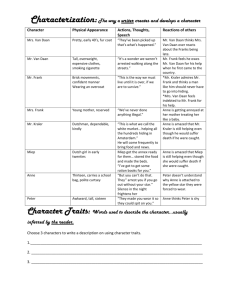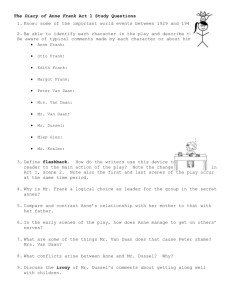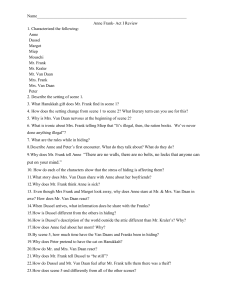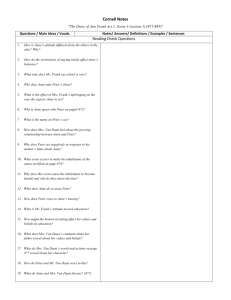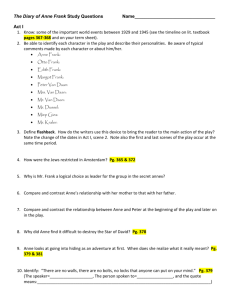Excerpt: Anne Frank's The Diary of a Young Girl
advertisement
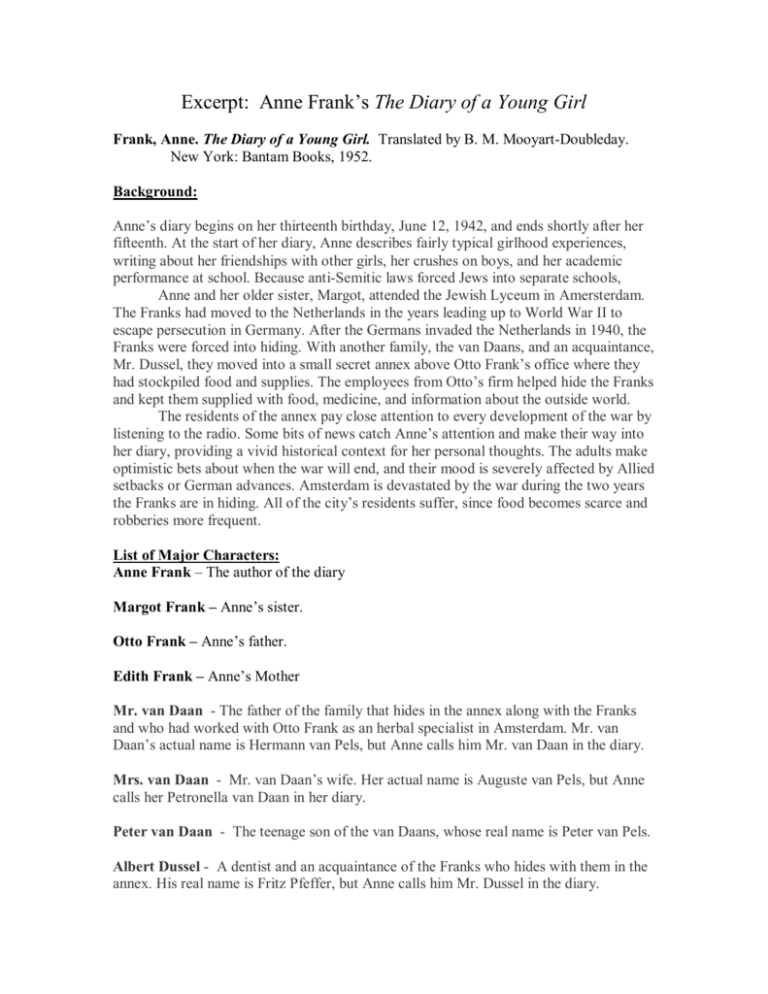
Excerpt: Anne Frank’s The Diary of a Young Girl Frank, Anne. The Diary of a Young Girl. Translated by B. M. Mooyart-Doubleday. New York: Bantam Books, 1952. Background: Anne’s diary begins on her thirteenth birthday, June 12, 1942, and ends shortly after her fifteenth. At the start of her diary, Anne describes fairly typical girlhood experiences, writing about her friendships with other girls, her crushes on boys, and her academic performance at school. Because anti-Semitic laws forced Jews into separate schools, Anne and her older sister, Margot, attended the Jewish Lyceum in Amersterdam. The Franks had moved to the Netherlands in the years leading up to World War II to escape persecution in Germany. After the Germans invaded the Netherlands in 1940, the Franks were forced into hiding. With another family, the van Daans, and an acquaintance, Mr. Dussel, they moved into a small secret annex above Otto Frank’s office where they had stockpiled food and supplies. The employees from Otto’s firm helped hide the Franks and kept them supplied with food, medicine, and information about the outside world. The residents of the annex pay close attention to every development of the war by listening to the radio. Some bits of news catch Anne’s attention and make their way into her diary, providing a vivid historical context for her personal thoughts. The adults make optimistic bets about when the war will end, and their mood is severely affected by Allied setbacks or German advances. Amsterdam is devastated by the war during the two years the Franks are in hiding. All of the city’s residents suffer, since food becomes scarce and robberies more frequent. List of Major Characters: Anne Frank – The author of the diary Margot Frank – Anne’s sister. Otto Frank – Anne’s father. Edith Frank – Anne’s Mother Mr. van Daan - The father of the family that hides in the annex along with the Franks and who had worked with Otto Frank as an herbal specialist in Amsterdam. Mr. van Daan’s actual name is Hermann van Pels, but Anne calls him Mr. van Daan in the diary. Mrs. van Daan - Mr. van Daan’s wife. Her actual name is Auguste van Pels, but Anne calls her Petronella van Daan in her diary. Peter van Daan - The teenage son of the van Daans, whose real name is Peter van Pels. Albert Dussel - A dentist and an acquaintance of the Franks who hides with them in the annex. His real name is Fritz Pfeffer, but Anne calls him Mr. Dussel in the diary. Mouschi – The cat. The Diary of a Young Girl, pages: 199-203 Tuesday, 11 April, 1944 Dear Kitty, My head throbs, I honestly don’t know where to begin. On Friday (Good Friday) we played Monopoly, Saturday afternoon too. These days passed quickly and uneventfully. On Sunday afternoon, on my invitation, Peter came to my room at half past four, at a quarter past five we went to the front attic, where we remained until six o’clock. There was a beautiful Mozart concert on the radio from six until a quarter past seven. I enjoyed it all very much, but especially the “Kleine Nachtmusik.” I can hardly listen in the room because I’m always so inwardly stirred when I hear lovely music. On Sunday evening Peter and I went to the front attic together and, in order to sit comfortably, we took with us a few divan cushions that we were able to lay our hands on. We seated ourselves on one packing case. Both the case and the cushions were very narrow, so we sat absolutely squashed together, leaning against other cases. Mouschi kept us company too, so we weren’t unchaperoned. Suddenly, at a quarter to nine, Mr. Van Daan whistled and asked if we had one of Dussel’s cushions. We both jumped up and went downstairs with cushion, cat, and Van Daan. A lot of trouble arose out of this cushion, because Dussel was annoyed that we had one of his cushions, one that he used as a pillow. He was afraid that there might be fleas in it and made a great commotion about his beloved cushion! Peter and I put two hard brushes in his bed as a revenge. We had a good laugh over this little interlude! Our fun didn’t last long. At half past nine Peter knocked softly on the door and asked Daddy if he would just help him upstairs over a difficult English sentence. “That’s a blind,” I said to Margot, “anyone could see through that one!” I was right. They were in the act of breaking into the warehouse. Daddy, Van Daan, Dussel, and Peter were downstairs in a flash. Margot, Mummy, Mrs. Van Daan, and I stayed upstairs and waited. Four frightened women just have to talk, so talk we did, until we heard a bang downstairs. After that all was quiet, the clock struck a quarter to ten. The color had vanished from our faces, we were still quiet, although we were afraid. Where could the men be? What was that bang? Would they be fighting the burglars? Ten o’clock, footsteps on the stairs: Daddy, white and nervous, entered, followed by Mr. Van Daan. “Lights out, creep upstairs, we expect the police in the house!” There was no time to be frightened: the lights went out, I quickly grabbed a jacket, and we were upstairs. “What has happened? Tell us quickly!” There was no one to tell us, the men having disappeared downstairs again. Only at ten past ten did they reappear; two kept watch at Peter’s open window, the door to the landing was closed, the swinging cupboard shut. We hung a jersey round the night light, and after that they told us: Peter heard two loud bangs on the landing, ran downstairs, and saw there was a large plank out of the left half of the door. He dashed upstairs, warned the “Home Guard” of the family, and the four of them proceeded downstairs. When they entered the warehouse, the burglars were in the act of enlarging the hole. Without further thought Van Daan shouted: “Police!” A few hurried steps outside, and the burglars had fled. In order to avoid the hole being noticed by the police, a plank was put against it, but a good hard kick from outside sent it flying to the ground. The men were perplexed at such impudence, and both Van Daan and Peter felt murder welling up within them; Van Daan beat on the ground with a chopper, and all was quiet again. Once more they wanted to put the plank in front of the hole. Disturbance! A married couple outside shone a torch through the opening, lighting up the whole warehouse. “Hell!” muttered one of the men, and now they switched over form their role of police to that of burglars. The four of them sneaked upstairs, Peter quickly opened the doors and windows of the kitchen and private office, flung the telephone onto the floor, and finally the four of them landed behind the swinging cupboard. END OF PART ONE The married couple with the torch would probably have warned the police: it was Sunday evening, Easter Sunday, no one at the office on Easter Monday, so none of us could budge until Tuesday morning. Think of it, waiting in such fear for two nights and a day! No one had anything to suggest, so we simply sat there in pitch-darkness, because Mrs. Van Daan in her fright had unintentionally turned the lamp right out; talked in whispers, and at every creak one heard “Sh! sh!” It turned half past ten, eleven, but not a sound; Daddy and Van Daan joined us in turns. Then a quarter past eleven, a bustle and noise downstairs. Everyone’s breath was audible, otherwise no one moved. Footsteps in the house, in the private office, kitchen, then . . . on our staircase. No one breathed audibly now, footsteps on our staircase, then a rattling of the swinging cupboard. This moment is indescribable. “Now we are lost!” I said, and could see us all being taken be the Gestapo that very night. Twice they rattled at the cupboard, then there was nothing, the footsteps withdrew, we were saved so far. A shiver seemed to pass from one to another, I heard someone’s teeth chattering, no on said a word. There was not another sound in the house, but a light was burning on our landing, right in front of the cupboard. Could that be because it was a secret cupboard? Perhaps the police had forgotten the light? Would someone come back to put it out? Tongues loosened, there was no one in the house any longer, perhaps there was someone on guard outside. Next we did three things: we went over again what we supposed had happened, we trembled with fear, and we had to go to the lavatory. The buckets were in the attic, so all we had was Peter’s tin wastepaper basket. Van Daan went first, then Daddy, but Mummy was too shy to face it. Daddy brought the wastepaper basket into the room, where Margot, Mrs. Van Daan, and I gladly made use of it. Finally, Mummy decided to do so too. People kept on asking for paper – fortunately I had some in my pocket! The tin smelled ghastly, everything went on in a whisper, we were tired, it was twelve o’clock. “Lie down on the floor then and sleep.” Margot and I were each given a pillow and one blanket; Margot lying just near the store cupboard and I between the table legs. The smell wasn’t quite so bad when one was on the floor, but still Mrs. Van Daan quietly brought some chlorine, a sea towel over the pot serving as a second expedient. Talk, whispers, fear, stink, flatulation, and always someone on the pot; then try to go to sleep! However, by half past two I was so tired that I knew no more until half past three. I awoke when Mrs. Van Daan laid her head on my foot. “For heaven’s sake, give me something to put on!” I asked. I was given something, but don’t ask what – a pair of woolen knickers over my pajamas, a red jumper, and a black skirt, white oversocks and a pair of sports stockings full of holes. Then Mrs. Van Daan sat in the chair and her husband came and lay on my feet. I lay thinking till half past three, shivering the whole time, which prevented Van Daan from sleeping. I prepared myself for the return of the police, then we’d have to say that we were hiding, they would either be good Dutch people, then we’d be saved, or N. S. B. – ers (The Dutch National Socialist Movement), then we’d have to bribe them! “In that case, destroy the radio,” sighed Mrs. Van Daan. “Yes, in the stove!” replied her husband. “If they find us then let them find the radio as well!” “Then they will find Anne’s diary,” added Daddy. “Burn it then,” suggested the most terrified member of the party. This, and when the police rattled the cupboard door, were my worst moments. “Not my diary; if my diary goes, I go with it!” But luckily Daddy didn’t answer. There is no object in recounting all the conversations that I can still remember; so much was said. I comforted Mrs. Van Daan, who was very scared. We talked about escaping and being questioned by the Gestapo, about ringing up, and being brave. “We must behave like soldiers, Mrs, Van Daan. If all is up now, then let’s go for Queen and Country, for freedom, truth, and right, as they always say on the Dutch News from England. The only thing that is really rotten is that we get a lot of other people into trouble too.

